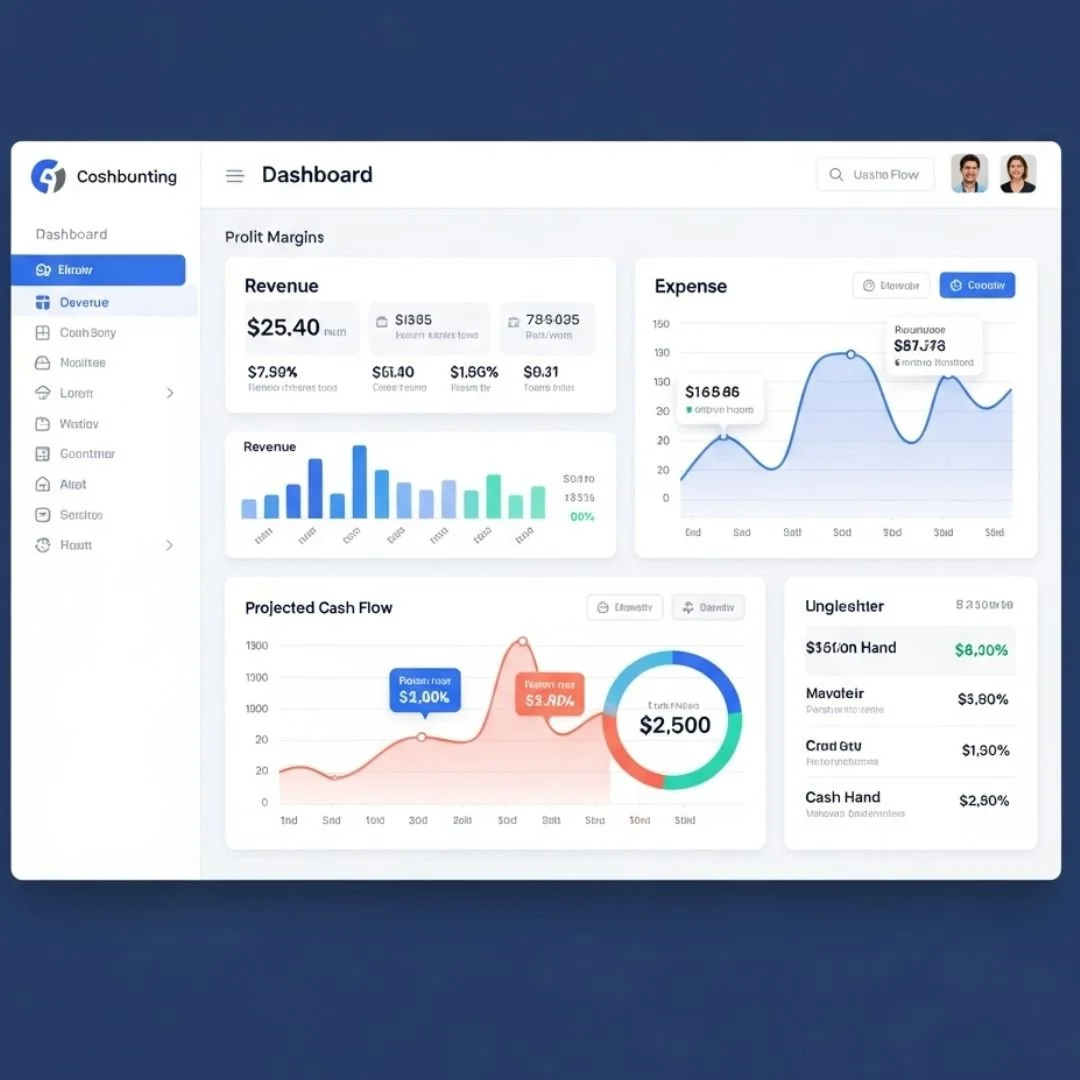How Accounting Automation Drives Startup Success
If your idea of accounting automation is emailing spreadsheets to your bookkeeper and hoping for the best—no. That’s not automation. That’s startup theatre. And every time you manually tag another Uber receipt at 11:49 PM, somewhere, your future self rolls their eyes so hard it echoes.
Denver startups are scrappy, sure. But confusing scrappiness with inefficiency is how smart founders quietly lose control of their finances before they even start scaling. Real accounting automation doesn't just save time, it gives you back decisions you didn’t know you were winging. Real-time numbers. Predictable margins. Less second-guessing when payroll hits.
In this piece, we’ll show how cloud accounting puts small teams on grown-up footing—without the CFO price tag. Especially for Denver founders juggling five roles and one bank account, the difference is surgical.
What Is Accounting Automation?
If you still think accounting automation means sending PDFs to your bookkeeper and ka‑ching—you’re off by a mile. Accounting automation is the serious use of software to handle repetitive financial tasks—like generating invoices, matching expenses, and reconciling bank transactions—without you hovering over spreadsheets at midnight. It’s the engine behind modern startup bookkeeping, and Denver teams leaning on cloud accounting software already know the difference.
At its core, accounting automation uses rules, AI, and APIs to sort incoming money and outgoing expenses into the right categories. That means no more manually tagging Uber rides or receipts—software does it for you, and usually more accurately than humans. Major providers define it as “software that helps perform essential functions involved in maintaining a business's financial records”. HighRadius confirms the impact: automation slashes manual data entry, boosts accuracy, and frees your team to focus on meaningful analysis.
With cloud accounting software—like QuickBooks Online, Xero, or FreshBooks—accounting automation plays a starring role. These platforms automatically pull bank feeds, code expenses using custom rules, generate recurring invoices, and even scan receipts with OCR. That means human error tanks, time saved skyrockets, and your financial management tools mature from basic tracking to strategic arsenal.
For Denver startups, this translates into fewer midnight spreadsheet sessions and more headspace to build, sell, or pitch. And the knock-on effect is… founders report faster month-end close times and a clear reduction in misclassification errors—enough to save tens of thousands annually when it comes to tax.
Accounting automation is a game-changer. It gives startups consistency in bookkeeping, clarity in cash flow, and confidence heading into investor meetings. When smart founders swap tedious tasks for real-time dashboards, they stop guessing and start seeing actual data—without the human-induced noise.
What Is Cloud Accounting?
So what exactly is cloud accounting, and why are Denver founders buzzing about it instead of clinging to old-school desktop apps? Cloud accounting is web-based software for managing finances—available anywhere, anytime, with a reliable internet connection. It moves your financial records off dusty office computers onto secure, remotely hosted servers. No installations. No backups. Just professional-grade software that you access through your browser or mobile app.
How Cloud Accounting Actually Works
Cloud-based accounting systems link your bank, credit cards, payment platforms, and invoicing systems into one hub. As transactions occur, they sync automatically, and smart software categorizes them according to pre-set rules or AI suggestions. You and your accountant see the same live figures—no file-shuffling, version collisions, or data silos.
NetSuite reports that 71% of accounting firms using cloud-based technology saw improved profitability last year. It means less wasted time and fewer redundant steps in your financial operations.
Cloud based accounting transforms startup bookkeeping from periodic busywork into proactive financial control. Need a cash flow snapshot before a pitch? It’s available. Want to check payroll health while waiting for your coffee in RiNo? Done.
Key Features That Matter
Real-time updates: You don’t close books—you watch them close.
Integrations: Most cloud accounting services plug into Stripe, Shopify, Gusto, and more, so you stop juggling CSVs.
Security: Data is encrypted, backed up, and protected off-site. Not lost in a stolen laptop.
Multi-user access: Your CEO, VA, and CPA all log in—no overhead, no gatekeeper.
This isn’t desktop software with a fancy license—it’s a fundamental shift. Traditional accounting ties you to one computer, forces periodic manual backups, and depends on you to update software. Cloud accounting services eliminate that friction entirely.
For Denver founders, cloud accounting lets you peek into your books at a LoDo pitch event, or approve an invoice from a co-working space in RiNo. It’s the backbone of smarter bootstrapping—keep your finances lean, glass-like, and investor-ready, without overpaying for full-time accounting help.
How Accounting Automation and Cloud Accounting Empower Startups
You don’t need another glorified spreadsheet. You need a back office that runs like it understands startup chaos without treating your time like it’s disposable. Here’s where accounting automation and cloud based small business accounting start pulling real weight—without waiting for you to burn out first.
Boosting Efficiency with Automation
You’re not “wearing many hats.” You’re being robbed—by repetitive admin. If you're still manually running payroll, triple-checking expense categories, or chasing your own tail in reconciliation hell, it’s not lean. It’s slow. It’s wildly unnecessary.
Accounting automation is what happens when you let software do the stuff humans forget, hate, or get wrong. Think of it like hiring a team that never sleeps, never miskeys, and never files anything under “miscellaneous.” This automation is a key part of the comprehensive accounting and bookkeeping services for startups that help small businesses focus on growth instead of administrative tasks. Integrated accounting software now handles payroll, reconciliations, invoicing, and even transaction coding automatically. Teams using automation shave off hours per week and reduce tax-season “surprises” by a landslide.
Unlocking Insights with Financial Data Analytics
Guessing is not a strategy. But if your financials are stuck in quarterly snapshots, that’s exactly what you’re doing. Cloud accounting tools equipped with financial data analytics hand you dashboards that update in real time—tracking your cash flow, expenses, revenue velocity, and other things you only wish your spreadsheets could calculate properly.
Goodbye static reports. Hello informed decisions.
One Denver startup spotted a slow-dripping $1,500/month subscription leak using analytics—and recovered $18,000 a year with one cancellation. That’s what happens when cloud accounting services let you see exactly what your money is doing instead of hoping your gut instinct is good enough to pass for CFO logic.
These dashboards are your financial x-ray machine.
Scalability and Cost Savings
Every founder loves the idea of scaling—until their accounting system collapses under the weight of growth. Most traditional tools were built for stability, not acceleration. Cloud based small business accounting doesn’t blink when you double your invoice volume. It just syncs, processes, and keeps moving.
And the cost? You pay for usage, not for bloat. Cloud cost management tools help startups avoid the infamous “we grew and now we can’t breathe” moment. You stay lean, automated, and accurate without hiring a finance department prematurely.
Integrated accounting software removes manual bottlenecks. It scales as fast as you do—and won’t ask for a raise.



Why Denver Startups Should Embrace These Tools
You don’t have 50 employees or a six-person finance department. You’ve got a pitch deck, maybe a co-founder, and a Google Sheet that’s one Excel crash away from catastrophe. That’s why you don’t need more meetings—you need fewer mistakes. And that’s exactly what accounting automation gives you.
Forget the old script: “We’ll hire a bookkeeper when we raise.” No. Get this wrong early, and you won’t raise anything. Clean books win funding rounds. Sloppy records—especially the ones that live in unlabeled CSVs—don’t even get second looks. Real startup bookkeeping happens in real-time, using financial management tools that actually mean something to investors, regulators, and yes, your future self.
Cloud accounting services don’t just help you file on time—they help you stay fundable. In a city where VCs are reviewing 20 decks before lunch, you don’t get a redo on due diligence. Tools like Gusto, QuickBooks Online, and other integrated accounting software let Denver founders auto-sync payroll, expenses, and tax filings to meet both federal and Colorado-specific obligations without falling into compliance limbo.
And let’s talk about scale. Founders chasing growth without cloud cost management tools are gambling with fire. Manual tracking gets you lost in the first 100 invoices. Automated systems adapt. You grow. They keep pace. You raise. They scale. No bottlenecks, no creeping bloat, no “sorry we need to rebuild the whole chart of accounts this quarter” nonsense.
So yeah—these aren’t just tools. They’re the difference between staying agile and slowly suffocating under your own admin. Denver’s startup scene is already saturated. Use tech that actually gives you a margin of error. Or stay stuck being the startup that couldn’t scale past spreadsheets.
Conclusion
You’ve got enough to worry about—your accounting shouldn’t be one of them. Accounting automation isn’t some extra feature for when you finally “make it.” It’s the only reason some startups make it in the first place.
When your numbers are real-time, your audit trail is automated, and your tax prep doesn’t require trauma recovery, you move faster. You sound smarter. You look investable. And you stop guessing your way through cash decisions like it’s a board game.
Cloud cost management tools. Financial management tools. Integrated accounting software. They’re what top-tier Denver startups are already using while the rest are still emailing PDFs back and forth.
If you’re trying to run lean, raise smart, and build something real, you need tools that make your finances scalable, clean, and bulletproof. That’s non-negotiable.
Frequently Asked Questions
-
No, automation won’t replace accountants—it’ll just replace the mind-numbing tasks they hate. Think less data entry, more strategic advising. Accounting automation handles the grunt work so professionals can focus on forecasting, compliance, and financial insights that actually move the needle.
-
An automated account refers to a system-managed financial account where transactions are recorded, categorized, and updated using accounting automation software. It reduces manual input and ensures consistent, real-time financial tracking for accuracy and compliance.
-
AI in accounting uses machine learning and algorithms to automate tasks like invoice processing, fraud detection, and predictive financial analysis. It’s built into modern financial management tools to increase speed, accuracy, and strategic insight across accounting operations.
READ MORE…
The Essential Benefits of Outsourced Accounting Services in Denver


